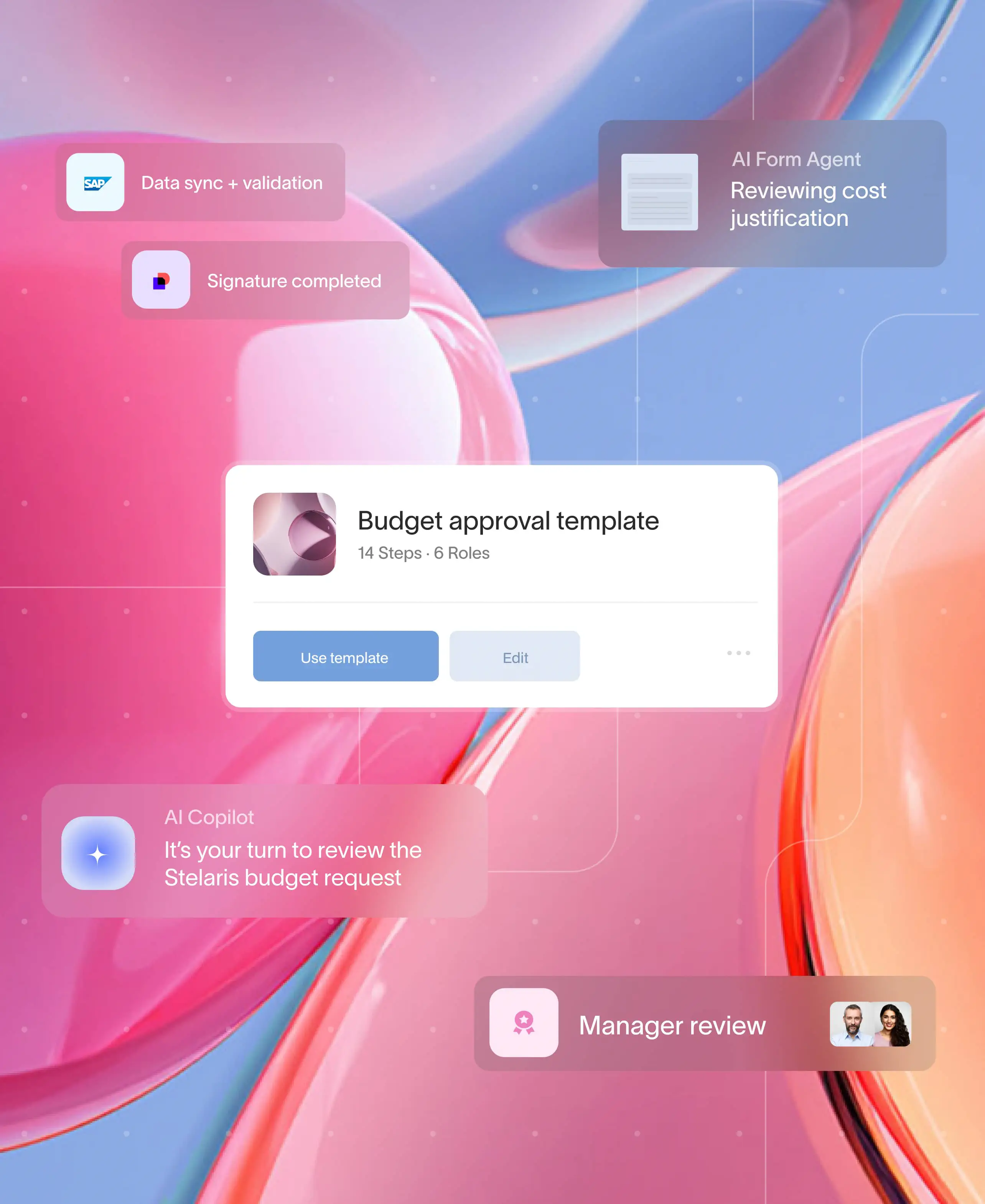
At a glance
For most organizations, contracts aren’t just documents — they’re revenue drivers. Yet too often, deals stall because contract workflows are fragmented, manual, or overly dependent on email. According to Deloitte, companies with strong contract management practices shorten sales cycles by up to 20% compared to peers.
Workflow contract management provides the structure to accelerate approvals, eliminate bottlenecks, and free up teams to focus on higher-value activities. This article explores why workflow contract management is central to faster revenue cycles, what challenges it solves, and how modern orchestration platforms help organizations scale. For a broader overview, see our guide on contract management workflows.
What is workflow contract management
Workflow contract management is the process of organizing and orchestrating every action required to create, approve, negotiate, and sign contracts. Unlike simple storage or lifecycle tools, workflow contract management emphasizes timely action and accountability at each stage, ensuring contracts move forward without unnecessary delay.
By embedding workflows into daily operations, businesses transform contracts from a source of delays into a competitive advantage.
Why contracts slow down revenue
Even when businesses close a deal, contracts often extend sales cycles unnecessarily.
Approval bottlenecks delay revenue recognition when leaders don’t respond on time.
Client-side confusion emerges when external parties are left out of the workflow.
Compliance delays occur when legal reviews are not tracked or logged properly.
Manual processes require sales teams to chase signatures instead of focusing on new opportunities.
Harvard Business Review notes that sales teams spend up to 18% of their time chasing internal approvals, much of it related to contract workflows.
The revenue impact of workflow contract management
Implementing structured workflows delivers measurable ROI:
- Shorter cycle times. Deals close faster when steps are clearly defined.
- Reduced risk. Audit-ready trails ensure compliance.
- Happier clients. A smooth process reflects professionalism and builds trust.
- Higher win rates. Fewer deals are lost due to delays.
These outcomes explain why workflow contract management is no longer optional — it’s essential for revenue-driven organizations.
Real-world example: accelerating enterprise sales
An enterprise SaaS company struggled with slow contracting cycles that frustrated both sales reps and clients. By introducing workflow contract management, they reduced contract turnaround time from 30 days to 18 days. This acceleration not only helped meet revenue targets but also improved client satisfaction during onboarding.
For a related use case, see our post on the contracts process, which outlines why structured processes matter across industries.
What to look for in a workflow contract management platform
When evaluating solutions, businesses should prioritize platforms that:
Support external stakeholders with a client-facing interface.
Centralize collaboration to prevent version chaos.
Automate reminders so approvals and signatures never stall.
Provide audit trails for compliance and visibility.
Moxo’s orchestration platform was designed for these revenue-critical workflows. By blending automation, client collaboration, and intelligent nudges, it ensures contracts never become the reason deals are delayed.
Best practices for faster revenue cycles
Integrate workflows with CRM. Sales reps should never need to leave their CRM to manage contracts.
Use templates to reduce friction. Consistent agreements reduce negotiation time.
Set escalation paths. If approvals stall, workflows should escalate automatically.
Analyze cycle times. Track where delays occur and refine.
These practices build the foundation for an efficient contract workflow that scales as business grows.
Frequently asked questions
What is workflow contract management
It is the orchestration of every step required to draft, review, approve, and execute contracts, with emphasis on accountability and timely action.
How does workflow contract management impact revenue
By eliminating delays and reducing bottlenecks, it shortens sales cycles and accelerates revenue recognition.
What features should a workflow contract management platform include
Client-facing participation, centralized collaboration, automated reminders, and audit-ready compliance tracking.
Can workflow contract management benefit small sales teams
Yes. Even small organizations can accelerate deal cycles and reduce administrative burden by implementing structured workflows.
Don’t let contracts slow down revenue
When contract workflows stall, so does revenue. Workflow contract management ensures every approval, signature, and client action happens without delay. Moxo empowers businesses to accelerate revenue cycles with orchestrated workflows that keep deals moving. Book a 15 minute demo and discover how Moxo can help you close faster.






